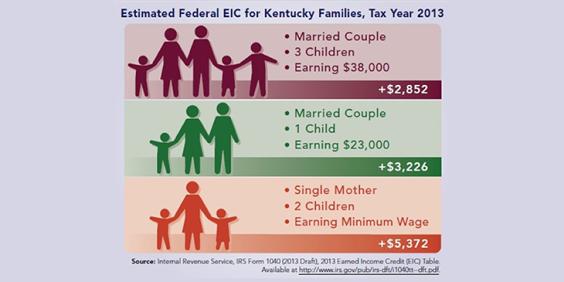KYA Pursues EITC to Help Children and Families

Kentucky Youth Advocates (KYA) works to improve the well-being of Kentucky’s children, using research, communication, and partnerships to educate decision makers and advocate for policies to keep children and families healthy, safe, and secure. Looking for opportunities to combat the dual problems of poor health and poverty in their state, KYA chose to pursue a state-wide Earned Income Tax Credit (EITC).
KYA selected the EITC for its clear links to improving health outcomes, its ability to generate local economic activity, and its history of bipartisan support. “We’ve seen so much success from the federal EITC that we wanted to build on that success with a state-wide version, as several of our neighboring states have,” said Katie Carter, former policy director, Kentucky Youth Advocates.
Kentucky has consistently poor health outcomes and one of the highest poverty rates in the nation. Ten years ago, 1 in 5 Kentucky children lived in poverty; today it’s more than 1 in 4. Working with a coalition that includes Louisville-based Metro United Way, the Kentucky Domestic Violence Association, Children Inc., and member organizations of Blueprint for Kentucky’s Children, and Community Action Kentucky, KYA has undertaken an effort to educate legislators and community members about the benefits of the EITC.
A combination of communications, research, and data has driven this effort since it started in 2012. KYA created legislative district fact sheets that provide information on the EITC’s impact for individual districts and published an issue brief at the end of 2013 detailing the EITC’s positive effects on local economies and working families. “Our work to publish county level and legislative district specific data has been important. It is easier to educate a policy maker if you can quickly tell her how her district will be impacted by this,” said Carter.
KYA has also worked to bring in other allies and messengers, including local small businesses, unions, faith groups, and city officials. “I can talk forever about the benefits of an EITC, but hearing it directly from the family or business owner would make much more of an impact,” said Carter. When groups have spoken up with concerns about the EITC, KYA has followed-up with rapid response education, both state-wide and locally.
One of the biggest challenges of enacting an EITC in Kentucky has been the tight state budget, which has included cuts to child and family services since 2008. Lessons learned over two previous legislative sessions have helped KYA refine and adapt its work. In the 2014 session, KYA partnered with a state senator to make the EITC a standalone piece of legislation, rather than trying to get it into the biennial budget, which was the strategy used in 2012. The standalone piece of legislation allows for KYA to have more focused conversations with legislators about this important issue. Their goal has evolved as well, setting aside an earlier effort to enact both a refundable Child and Dependent Care Tax Credit (CDCTC) and a Kentucky EITC, and now focusing only on the EITC.
“Patience is key when working towards any kind of legislative change,” said Carter, “and being able to find funders that understand that policy change takes time is important.” KYA continues to work toward passage of a state-wide EITC and looks forward to seeing the standalone bill moving forward in 2014.
To learn more, visit www.kyyouth.org.
Communities in Action provide examples of strategies or tools in action. Their purpose is to connect like-minded communities in their implementation efforts, giving insight into how others are tackling key challenges and what they've accomplished. To learn more about the evidence supporting this strategy's effectiveness or resources to help move towards implementation, see the What Works for Health summary of the Earned Income Tax Credit (EITC).
Date added: March 26, 2014
